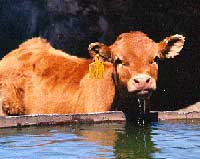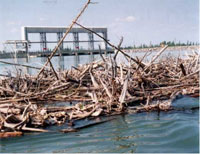
News |
- Arctic Report Shows Global Climate Impacts
- Forest Campaign Takes Aim at Tissue Manufacturers
- Livestock Amendments Dropped
- Ontario Won't Sign Great Lakes Agreement
- Ontario Can Fill Energy Gap With Renewables
- Manitoba's Water: Let's Make It Perfectly Clear
- Sierra Club Canada Honours Politicians
- Liberal Leader Supports World Heritage Site
- CBC Zeroes In On Water
- Environmental Groups Appeal CSA Certificates
- Boreal Booster From "22 Minutes"
- Hydro Discussed at Environmental Justice Conference
Arctic Report Shows Global Climate Impacts |
29 November 04 |
 The Arctic is warming much more rapidly than previously known, at nearly twice the rate as the rest of the globe. Increasing greenhouse gases from human activities are projected to make the Arctic warmer still, according to an unprecedented four-year scientific study of the region conducted by an international team of 300 scientists.
The Arctic is warming much more rapidly than previously known, at nearly twice the rate as the rest of the globe. Increasing greenhouse gases from human activities are projected to make the Arctic warmer still, according to an unprecedented four-year scientific study of the region conducted by an international team of 300 scientists.The Arctic Climate Impact Assessment report, released November 8, 2004 in Iceland, says that a warmer Arctic will also have negative impacts around the world. The pace of global warming will accelerate, affecting migratory species that feed and breed in the Arctic, possibly slowing the ocean circulation that brings heat from the tropics to the poles. Climate change could threaten the long-term survival of numerous species including polar bears, and the cultures of northern aboriginal peoples. Aboriginal groups in Canada and beyond seized on the Arctic Climate Impact Assessment to urge governments to take quick action to head off worst-case scenarios. The assessment's projections are based on a moderate estimate of future emissions of carbon dioxide and other greenhouse gases, and incorporate results from five major global climate models used by the Intergovernmental Panel on Climate Change (IPCC). View the Arctic Climate Impact Assessment (ACIA) press release View the report Impacts of a Warming Arctic: Arctic Climate Impact Assessment View the previous (October 2004) Manitoba Wildlands news story on the report View the statement by Klaus Toepfer, Executive Director of UNEP View the Government of Canada November 8, 2004 news release View the CBC North news story View the CBC news stories; one, two View the WWF US press release Sources: ACIA, CBC News, WWF US
Image courtesy of NRDC |
|
Forest Campaign Takes Aim at Tissue Manufacturers |
25 November 04 |
 Calling on the maker of Kleenex and Scott tissue products to stop destroying ancient forests, Greenpeace Canada and NRDC (Natural Resources Defense Council) launched an international campaign against Kimberly-Clark for its primary role in destroying Canada's boreal forest. The groups want the company, the world's leading tissue product manufacturer, to use significantly more post-consumer recycled paper or agricultural residues in its products.
Calling on the maker of Kleenex and Scott tissue products to stop destroying ancient forests, Greenpeace Canada and NRDC (Natural Resources Defense Council) launched an international campaign against Kimberly-Clark for its primary role in destroying Canada's boreal forest. The groups want the company, the world's leading tissue product manufacturer, to use significantly more post-consumer recycled paper or agricultural residues in its products. In 2003, Kimberly-Clark produced more than 1,275,000 tons of tissue products in North America, of which more than 30 percent came from pulp made from Canada's ancient boreal forest. The company relies on recycled sources for only 19 percent of the pulp it uses in North America to make toilet paper, facial tissue, napkins and paper towels for home use. The company uses no recycled content at all to manufacture grocery store brands such as Kleenex and Scott. Companies such as Cascades - Canada's second largest tissue product manufacturer - meets 96 percent of its pulp requirements with recycled fiber. The conservation groups are demanding that Kimberly-Clark:
View the NRDC Backgrounder 'Kimberly-Clark: A Major Destroyer of Ancient Forests' View the GreenPeace KleerCut web site |
|
Livestock Amendments Dropped |
25 November 04 |
 The Government of Manitoba announced that it will not proceed with Bill 40 - The Planning Amendment Act, containing changes concerning how municipalities consider applications to develop or expand intensive livestock operations. The introduction of Bill 40 earlier in 2004 followed recommendations from the Livestock Stewardship Initiative Panel.
The Government of Manitoba announced that it will not proceed with Bill 40 - The Planning Amendment Act, containing changes concerning how municipalities consider applications to develop or expand intensive livestock operations. The introduction of Bill 40 earlier in 2004 followed recommendations from the Livestock Stewardship Initiative Panel. The Minster of Intergovernmental Affairs indicated that the decision regarding Bill 40 was made because positive intents of the Livestock Stewardship Initiative will be accomplished through Bill 22 - The Water Protection Act, and amendments to the Livestock Manure and Mortalities Management Regulation. Manitoba Wildlands Director, Gaile Whelan Enns voiced concern regarding the announcement, "Bill 40 is the latest legislative amendment Bill to be abandoned by this government. We have been waiting for Environment Act amendments for three years. It is also a stretch to say that Bill 22, The Water Protection Act (Bill 22), will fulfill the purpose of Bill 40. Surely Bill 22 is about water source protection!" The Minister listed issues that the government would be focusing on in coming months, including updating regulations for environmental protection and direction for livestock operations; better tools to assist municipalities in updating their development plans; and accelerating the overall review of the Planning Act, including more opportunities for public participation to ensure transparency. View the Government of Manitoba November 2, 2004 news release View Bill 40 - The Planning Amendment Act View the Livestock Stewardship Panel Report Sustainable Livestock Development in Manitoba - Finding Common Ground (December 2000) Source: Government of Manitoba
|
|
Ontario Won't Sign Great Lakes Agreement |
22 November 04 |
 Ontario Natural Resources Minister David Ramsay announced that Ontario will not sign an international agreement on The Great Lakes unless changes to enhance the level of protection for the waters of the Great Lakes Basin are made. The Ontario government has essentially agreed with stakeholders and citizens who have argued the agreement allows for wholesale water diversion. In public consultations held throughout Ontario during September, citizens clearly indicated that they opposed any water diversions from the Great Lakes. The Ontario government will continue talks with Quebec and eight U.S. states on an agreement covering the five Great Lakes.
Ontario Natural Resources Minister David Ramsay announced that Ontario will not sign an international agreement on The Great Lakes unless changes to enhance the level of protection for the waters of the Great Lakes Basin are made. The Ontario government has essentially agreed with stakeholders and citizens who have argued the agreement allows for wholesale water diversion. In public consultations held throughout Ontario during September, citizens clearly indicated that they opposed any water diversions from the Great Lakes. The Ontario government will continue talks with Quebec and eight U.S. states on an agreement covering the five Great Lakes.In July 2004, the U.S. governors, along with Ontario and Quebec, published a two-part draft agreement on regulation of Great Lakes basin water, including potential large diversions for use outside the basin. The second part gives the U.S. governors the right to decide on diversions irrespective of the provinces' or Canada's view, Minister Ramsay said, noting Ontario and Quebec do not have veto power on diversions as the eight states would have. (Previous public outrage on both sides of the Canada-U.S. border led to the signing of the Great Lakes Charter Annex in 2001, which strengthened protection of the basin waters and led to the draft agreements released in July 2004.) On November 18, 2004, the Council of Canadians warned the Parliamentary Committee on Environment and Sustainable Development of the dangers of the proposed Great Lakes Annex. This is the first time Parliament has reviewed the Draft Annex 2001 Implementing Agreements. The Committee will make recommendations to Parliament on how the federal government should respond to this highly controversial issue. The Council of Canadians continues to assert that this issue is of national interest, and must be addressed by the Federal government. View the November 15, 2004 press release from Ontario's Ministry of Natural Resources View the November 16, 2004 Toronto Star article posted on the Waterhole web site View the November 15, 2004 press release from the Council of Canadians Sources: Ontario MNR, Council of Canadians, The Toronto Star
|
|
Ontario Can Fill Energy Gap With Renewables |
22 November 04 |
 A report by the David Suzuki Foundation shows that Ontario's looming supply-demand energy imbalance can be entirely filled with renewable energy, which is much cheaper and more reliable than nuclear power and large-scale natural gas.
A report by the David Suzuki Foundation shows that Ontario's looming supply-demand energy imbalance can be entirely filled with renewable energy, which is much cheaper and more reliable than nuclear power and large-scale natural gas.The report, Smart Generation: Powering Ontario with Renewable Energy shows how Ontario can:
View the October 20, 2004 press release by the David Suzuki Foundation Access the full report Smart Generation: Powering Ontario with Renewable Energy Source: David Suzuki Foundation
|
|
Manitoba's Water: Let's Make It Perfectly Clear |
22 November 04 |
 Lake Winnipeg's 25,000 square kilometers is only a drop in the water. This massive lake's watershed includes four Canadian provinces and four U.S. states. That means anything draining from the creeks, rivers, lakes, lagoons or marshes within that parameter will eventually end up in Lake Winnipeg.
Lake Winnipeg's 25,000 square kilometers is only a drop in the water. This massive lake's watershed includes four Canadian provinces and four U.S. states. That means anything draining from the creeks, rivers, lakes, lagoons or marshes within that parameter will eventually end up in Lake Winnipeg. Interviews for this article included Gaile Whelan Enns, Director of Manitoba Wildlands. "We're spending tens of millions of dollars of infrastructure money for upgrades in water systems, but we're not conserving water. Water conservation should be a criteria for all public funding for these projects." View the full Fall 2004 Cottager Article by Nancy Jakubic Visit the Cottager Magazine web site |
|
Sierra Club Canada Honours Politicians |
18 November 04 |
 Honourable David Anderson and Mr. Clifford Lincoln received awards from the Sierra Club of Canada and Sierra Club of Canada Foundation in a ceremony on November 15, 2004. David Anderson, BC Member of Parliament and former Minister of the Environment received the John Fraser Award for Environmental Achievement for someone in public life who has made a significant and outstanding contribution to environmental protection. Clifford Lincoln, the Quebec environment minister in the 1980s, Quebec Member of Parliament, and parliamentary secretary to the federal Environment Minister, received the Sierra Club of Canada Lifetime Achievement Award.
Honourable David Anderson and Mr. Clifford Lincoln received awards from the Sierra Club of Canada and Sierra Club of Canada Foundation in a ceremony on November 15, 2004. David Anderson, BC Member of Parliament and former Minister of the Environment received the John Fraser Award for Environmental Achievement for someone in public life who has made a significant and outstanding contribution to environmental protection. Clifford Lincoln, the Quebec environment minister in the 1980s, Quebec Member of Parliament, and parliamentary secretary to the federal Environment Minister, received the Sierra Club of Canada Lifetime Achievement Award.David Anderson played a crucial role in achieving Canadian ratification of the Kyoto Protocol, has been a strong advocate of wilderness protection and has been steadfast in his opposition to lifting the moratorium on oil and gas exploration on the B.C. coast and off-shore. As Quebec Environment Minister, Clifford Lincoln took action to protect the health of people in a contaminated area of LaSalle, Quebec, responded to the PCB fire in St. Basile, and was an early political leader on the climate change issue. In his federal roles, he played a critical role in transferring regulation of pesticides form Agriculture Canada to Health Canada, assisted in the process of moving the Canadian Environmental Assessment Act through Parliament. Mr. Lincoln also played a key role in obtaining a stronger Canada National Parks Act, and the Canada National Marine Conservation Areas Act. View the Sierra Club of Canada press release Source: Sierra Club of Canada
|
|
CBC Zeroes In On Water |
15 November 04 |
 The CBC is the latest media outlet to profile water issues with the recent television drama "H2O". The drama was a fictional political thriller that features control of Canada's water resources at the centre of a high level political power play. CBC has also been covering water issues from a non-fiction perspective in its capacity as a news media outlet. From bulk water export, to water quality, to water scarcity, concerns about water are being brought to the attention of the Canadian public.
The CBC is the latest media outlet to profile water issues with the recent television drama "H2O". The drama was a fictional political thriller that features control of Canada's water resources at the centre of a high level political power play. CBC has also been covering water issues from a non-fiction perspective in its capacity as a news media outlet. From bulk water export, to water quality, to water scarcity, concerns about water are being brought to the attention of the Canadian public.Visit the web site for the CBC television drama "H2O" Visit the CBC news site in-depth on water issues |
|
Environmental Groups Appeal CSA Certificates |
10 November 04 |
 Environmental groups have initiated appeals procedures against eleven forestry operations that are certified to the CSA forestry standard, including those of Abitibi-Consolidated, Canadian Forest Products (2), Kruger, Stora Enso, Tolko, Weldwood, Western Forest Products and Weyerhaeuser (3).
Environmental groups have initiated appeals procedures against eleven forestry operations that are certified to the CSA forestry standard, including those of Abitibi-Consolidated, Canadian Forest Products (2), Kruger, Stora Enso, Tolko, Weldwood, Western Forest Products and Weyerhaeuser (3).The Sierra Legal Defence Fund, on behalf of the National Aboriginal Forestry Association (NAFA) and the Sierra Club of Canada (SCC), is appealing to auditing firms to have eleven CSA Sustainable Forest Management certifications suspended. The appeals are intended encourage and promote improved forestry practices and test the claim that the Canadian Standards Association (CSA) Sustainable Forest Management Standard is a performance based standard. The certificates under appeal include units in all seven provinces in which CSA is active (BC, AB, SK, ON, QC, NS, NF), with a total area of 13.3 million hectares. The decision to proceed with the appeals process arose out of a systematic review of how certified companies are implementing certain performance-related requirements in the standard. In eleven of the twelve operations investigated there were no reasonable grounds to conclude that CSA's requirements were being met in one or more instances; the operations also had targets and indicators that were deemed inadequate for achieving CSA requirements. A response from the auditors is expected. Information about the appeals is available on the Sierra Club of Canada web site A backgrounder on the review of the CSA certifications and the appeals is available on the Sierra Club of Canada web site or on the NAFA web site Sources: Sierra Club of Canada, NAFA
|
|
Boreal Booster From "22 Minutes" |
08 November 04 |
 The majesty, uniqueness and global significance of Canada's Boreal Forest are featured in a recent issue of Maclean's magazine. Comedienne Cathy Jones, of "This Hour Has 22 Minutes" fame describes her adventures paddling the Berens River and meeting the people of Pikangikum First Nation in Ontario during the Boreal Rendezvous. Pikangikum is one of the First Nation's who have nominated their lands to be included in a new boreal World Heritage Site. The Boreal Rendezvous was a Canadian Parks and Wilderness Society (CPAWS) event in the summer of 2003. "22 Minutes", a CBC TV weekly satire show, features Cathy Jones. The Boreal Rendezvous raised awareness about the special nature of Canada's boreal forest regions and the importance of safeguarding it intact and free from industrial development.
The majesty, uniqueness and global significance of Canada's Boreal Forest are featured in a recent issue of Maclean's magazine. Comedienne Cathy Jones, of "This Hour Has 22 Minutes" fame describes her adventures paddling the Berens River and meeting the people of Pikangikum First Nation in Ontario during the Boreal Rendezvous. Pikangikum is one of the First Nation's who have nominated their lands to be included in a new boreal World Heritage Site. The Boreal Rendezvous was a Canadian Parks and Wilderness Society (CPAWS) event in the summer of 2003. "22 Minutes", a CBC TV weekly satire show, features Cathy Jones. The Boreal Rendezvous raised awareness about the special nature of Canada's boreal forest regions and the importance of safeguarding it intact and free from industrial development.A book entitled 'Rendezvous with the Wild' that features tales of the paddlers' adventures is to be released in November 2004. View the Maclean's magazine story Visit the CPAWS Boreal Rendezvous web page Visit the Pikangikum First Nation web site Sources: Maclean's, CPAWS
|
|
Hydro Discussed at Environmental Justice Conference |
08 November 04 |
 Linking care for the earth with a preferential option for the poor, and the need to work for the common good were ideas central to a Catholic Environmental Justice conference held October 29-31, 2004 The conference brought together US theologians, scientists, academic specialists, bishops, heads of national Catholic organizations engaged in environmental issues, and social action leaders versed in Catholic social thought to consider these themes of Catholic social teaching.
Linking care for the earth with a preferential option for the poor, and the need to work for the common good were ideas central to a Catholic Environmental Justice conference held October 29-31, 2004 The conference brought together US theologians, scientists, academic specialists, bishops, heads of national Catholic organizations engaged in environmental issues, and social action leaders versed in Catholic social thought to consider these themes of Catholic social teaching.Manitoba Hydro was featured in an address by political science professor Steven M. Hoffman, "Powering Injustice: Hydroelectric Development And Aboriginal Communities In Northern Manitoba." The address illustrates that it is the poor who suffer most from degradation of the environment. Mr. Hoffman pointed out that 10 percent of the electricity providing cheap power in the St. Paul, Minnesota area comes from Manitoba, Canada, and its chain of hydroelectric dams on the Nelson River. The invitation-only meeting was jointly sponsored by the U.S. Conference of Catholic Bishops and the University of St. Thomas in St. Paul. The conference also featured several extensive panel discussions and visits by participants to several sites with environmental significance such as farming operations and environmental action projects. View the Catholic News Service article View Steve Hoffman's address: Powering Injustice: Hydroelectric Development And Aboriginal Communities In Northern Manitoba Source: Catholic News Service
|
|


 RSS Feeds:
RSS Feeds: Manitoba Liberal Leader Dr. Jon Gerrard is urging Manitoba's Doer government to adopt the East Side Planning Initiative (ESPI) report recommendation (5.3.2) that the province proceed actively to establish a boreal forest UNESCO (U.N.) World Natural and Cultural Heritage Site on the east side of Lake Winnipeg.
Manitoba Liberal Leader Dr. Jon Gerrard is urging Manitoba's Doer government to adopt the East Side Planning Initiative (ESPI) report recommendation (5.3.2) that the province proceed actively to establish a boreal forest UNESCO (U.N.) World Natural and Cultural Heritage Site on the east side of Lake Winnipeg. 